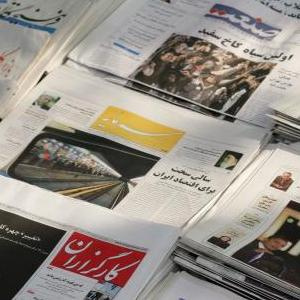Tehran's Daily Newspaper Review

Ahmadinejad's remarks on tax problems, and his renewed allegiance for velayat-e faqih were the most important news of the day. Iranian newspapers will take two days off to commemorate the death of Prophet Muhammad’s grandson Hussein (AS), martyred in a battle against the rule of notorious Umayyad caliph Yazid I.
Iran's top headlines were collected from Ahmadinejad's remarks in his speech for the Finance Ministry. “40% of the economy does not pay taxes” Ahmadinejad stated. In his meeting with a group of clerics on the same day, the president announced that he “won’t take one step backwards in the glorious path of velayat”, to ensure his audience that despite rumors and criticisms, he is not challenging the Supreme Leader’s authority. Iran also featured a report on the new political arrangements in Egypt following the first round of parliamentary election.
Jomhouri-ye Eslami’s top headline was a bespoke translation of Leon Panetta’s remarks on Friday: “the global movement for Israel's isolation has set off.” The newspaper also covered approval of Iran-proposed resolution on nuclear disarmament in the UN General Assembly, the Muslim Brotherhood’s electoral victory in Egypt, and test-firing of the latest products of the Iranian Army’s navy. The newspaper’s editorial on the subject of US withdrawal from Iraq argued that American troops’ moving out of Iraq following failed negotiations over granting capitulation to the US’ soldiers.
Kayhan victoriously reported of Islamic and anti-Imperialist movements spreading across the world. Ahmadinejad's comments on tax, warm reception of expelled Iranian diplomats by Islamist students and American farmers’ support for the Occupy Wall Street movement also appeared on Kayhan’s front page. The newspaper’s editorial traced the impact of Imam Hussein’s uprising against tyranny in the Islamic Awakening and its history among the North African and Middle Eastern countries.
“Egyptian Muslim Brotherhood manifests the glory of Islam to the West” Resalat published on its front page. Resalat’s editorial by Conservative MP Heshmatollah Falahatpishe, titled “England of Future, More Dangerous than Britain of Today”, stated that Britain has always tried to inflict a heavy cost on Iran upon severance of ties. The author warned of Britain’s dangerous strategies for the future of the region, while adding that Iranians have gained the required experience to counter their plots.
“Market defies Bahmani’s order” despite the Central Bank President’s promise that he will reduce the US Dollar and gold price, Shargh reported. “Iran has entered an unfair war” the newspaper quoted Ramin Mehmanparast, Foreign Minister Speaker, in an interview that mostly focused on post-sanction economy.
Qalibaf’s media team proved their knack for swinging between political camps, as his mouthpiece Tehran-e Emrooz’s top headline came from its interview with high-profile conservative maddah (1) Saeid Haddadian who warned lest that the UK Embassy seizure cast a shadow on the 2.6 billion dollar embezzlement case. Tehran-e Emrooz also covered the return of Iran's London Embassy staff to their motherland and their warm reception in the airport. “Bubbles that won’t burst” was Tehran-e Emrooz’ sarcastic headline alluding to Mahmoud Bahmani’s promise to bring down gold and dollar price.
(1) Maddah which can be literally translated as ‘tributer’ or ‘praiser’ is an individual who chants hymns during mourning rituals for the Shi’a imams, or on similar religious occasions. A number of Iranian maddahs, such as Mansour Arzi, have gained notable reputations and influence in the recent years.
* Notes:
The editorial section of Iranian newspapers is not the work of the editor-in-chief or the senior editorial staff of the newspaper by default, but can be a contribution by experts and politicians (typically agreeing with the newspaper’s political stance.) The newspapers may also occasionally publish without an editorial.
Vatan-e Emrooz daily does not publish on Thursdays.
Trouble with understanding some terms? Check our Glossary of Iranian Political Terms.
Briefing
Iran is the official organ of the administration. Its current editor-in-chief is Ali-Akbar Javanfekr, former media advisor to President Mahmoud Ahmadinejad.
Jomhouri-ye Eslami (The Islamic Republic) was known as the official organ of the Party of the Islamic Republic, founded in 1979 and disbanded in 1987. Currently, it is an open critic of Mahmoud Ahmadinejad's policies and is known to be a mouthpiece of Akbar Hashemi Rafsanjani.
Kayhan (Universe) is a hard-line conservative newspaper. Its editor-in-chief –currently Hossein Shari’atmadari- is directly appointed by Iran's Supreme Leader. Shari’atmadari’s editorials often spark off controversy and debate inside Iranian political circles.
Resalat (Mission) belongs to the moderate wing of the Principlist camp. Resalat’s best known analyst is Amir Mohebbian, its political editor.
Shargh (East) is a moderate Reformist newspaper. It was the most popular and influential Reformist newspaper in its first period of publication which lasted from August 2003 until September 2006.
Tehran-e Emrooz (Tehran Today) is a “Principlist/Reformist” newspaper, connected to Mohammad Baqer Qalibaf, Tehran Mayor and a likely candidate of the 2013 presidential election.

